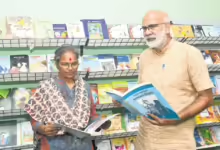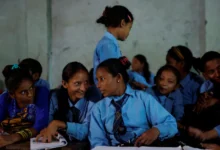-
NATIONAL

The worldwide significance of a Philippines court’s ruling against modified…
A landmark decision was made by a Philippine court, which invalidated government licenses allowing the…
Read More » -

-

-

-

-
UP STATE

Result for UP Board 12th Grade 2024: Increase in Overall…
The UP board class 12 results for 2024 have been made public by the Uttar…
Read More » -

-

-

-
BIHAR

In Bihar, a double engine keeps breaking down; Mallikarjun Kharge…
Taking a jab at Bihar Chief Minister Nitish Kumar on Friday, Congress President Mallikarjun Kharge…
Read More » -

-

-

-
ENTERTAINMENT

Details Inside. Kalki 2898 AD: Prabhas’s New Release Date Will…
Fans have been eagerly awaiting any news on the highly anticipated science fiction picture Kalki…
Read More » -
ENTERTAINMENT

Fewer Known Details About Kalpana, the Late Kannada Actress
Kalpana is one of the most well-liked actresses in the 1990s film industry. Her career…
Read More » -
ENTERTAINMENT

Shahid Kapoor seems “hard” during his “aaj ka mood” scenes…
Actor Shahid Kapoor, who is currently filming the suspenseful action thriller “Deva,” gave his fans…
Read More »
-
INTERNATIONAL

Pakistan Rues US Sanctions On Four Companies Providing Technology To…
After the US imposed sanctions on four companies for providing missile-applicable products to the financially…
Read More » -

-

-

-

-
HEALTH

Novel immunotherapy to combat cancer and protect healthy cells
A group of US scientists has created a novel immunotherapy method that targets tumors efficiently…
Read More » -

-

-

-
LIFESTYLE

The legendary center of Kerala’s fitness heritage is Ernakulam Gym
Kerala saw the height of the Gatta Gusthi sport between 1945 and 1970. Even if…
Read More » -

-

-

-
SPORTS

WWE SmackDown Results: Cody Rhodes Receives Backlash From WWE
Blockbuster action filled this week’s WWE Friday Night SmackDown, which aired live from the PPG…
Read More » -
SPORTS

Gautam Gambhir tells how he ‘picked’ the WI star for…
When Sunil Narine made his ODI debut against India back in 2011, former Indian cricketer…
Read More » -
SPORTS

Dipa finished fourth in the World Cup
New Delhi: Indian gymnast Dipa Karmakar concluded her career with yet another great fourth-place result…
Read More » -
SPORTS

Dawn whistle fights juvenile screen addiction while reviving the football…
TweeeeEEEEt! At first light, the booming whistle of coach Vimal T R announces the beginning…
Read More » -
SPORTS

IPL2024: KL Rahul of LSG and Ruturaj Gaikwad of CSK…
KL Rahul, the captain of the Lucknow Super Giants, and Ruturaj Gaikwad, the captain of…
Read More »


















